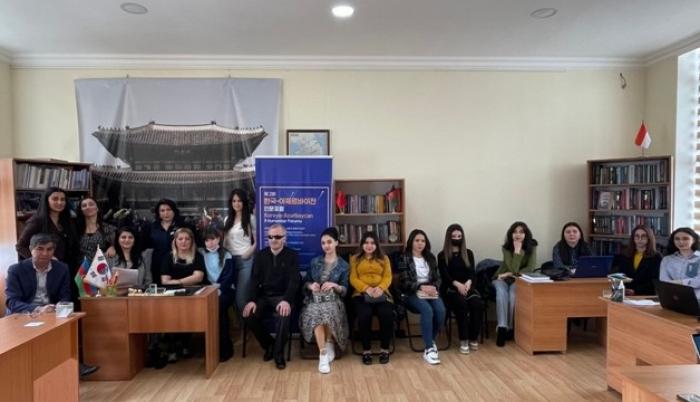
Department of Azerbaijan-Asian Literary Relations of ANAS Institute of Literature after Nizami Ganjavi held a seminar dedicated to the works of Ryunosuke Akutagawa, a prominent representative of Japanese literature.
Along with the employees of the department, the event was attended by 4th year students of the Azerbaijan-Asian Literary Relations Department of the Western Caspian University.
Speaking at the seminar, the head of the department, Doctor of Philology, Professor Badirkhan Ahmadli said that Japanese literature, with its ancient traditions and rich literary features, is a specific branch of world culture. He noted that the interest in Japanese literature in Azerbaijan, especially since the beginning of the XXI century, has entered a new stage of development. In this regard, the employee of the department emphasized that the research of Japanese scholar Gulnar Yunusova opened the way for a systematic and monographic study of Japanese literature in our literary criticism by studying a number of important features of Japanese literature.
Then Professor Badirkhan Ahmadli gave the floor to the speaker Gulnar Yunusova, emphasizing the urgency of the seminar, noting that in 2022, the 130th anniversary of the birth and 95th anniversary of the death of Ryunosuke Akutagawa, considered the smartest madman in Japan.
The employee of the Department Gulnar Yunusova gave a brief information on the life of Ryunosuke Akutagawa, who left a unique mark in Japanese literature as well as in world literature with her life of only 35 years. “Akutagawa defined the development of new literature in Japan by mixing what he received from Western literature with Japanese literature. He revealed the synthesis of Western and Japanese literature within the framework of national values without becoming an imitator of the West. During the creative period covering the years 1915-1927, he wrote more than 150 short stories. In the author's work, there is a clear revolt against everything that restricts human freedom, especially society, and oppresses the human spirit. The writer, who was ironic about the problems in the early stages of his career, ridiculed the ugliness of Japanese society and hoped that it would one day disappear. However, in the last years of his career, he became pessimistic, and human psychology became the center of his works. This is directly related to the writer's own situation.
Akutagawa, who proved to be a talented writer thanks to Rashomon, published in 1915, wrote one of the most important works of his literary career. What gave the work international value was its screenplay of the same name in 1950 by prominent Japanese filmmaker Akira Kurosawa. The film was the first Japanese film to win an international award in 1951, winning the Golden Lion Award at the Venice Film Festival.
Rashomon has historical and psychological significance. The author skillfully described the social situation of the time, the plight of the people. Akutagawa embodied the Japan of the time in Rashoma's face. "All this deplorable situation has exacerbated Akutagawa's hatred of society and his uncompromising stance against militarism and capitalism".
